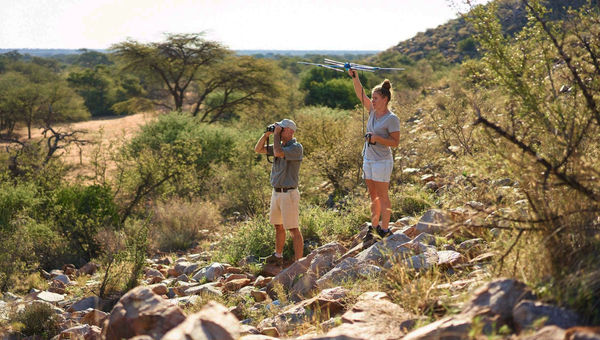
Dorine Reinstein
"Just because something is legal does not necessarily make it right."
That powerful statement from Cathrine S. Nyquist, co-founder of the big-cat sanctuary Panthera Africa, during the "Roaring Responsibly" panel discussion at WTM Africa highlighted the urgent need to prioritize animal welfare and conservation over profit-driven practices.
South Africa recently took a significant step toward ending the controversial practices of captive lion and rhino breeding. The Cabinet of South Africa approved a policy to close breeding facilities, end "canned" lion hunting, phase out intensive rhino breeding and restrict the export of live elephants, lions, leopards and rhinos. These changes represent a significant step, but industry experts emphasize more needs to be done.
Travelers today have become increasingly aware of the dark side of animal tourism. As a result, the demand for ethical and meaningful wildlife experiences is rising. But as Julie Cheetham, co-founder of Weeva, put bluntly: "It can be hard for travelers to know when an animal interaction is unethical."
And that's where the travel trade has a crucial role to play.
So how can travel agents ensure they are choosing the right operators and activities?
"The most important question is whether the wildlife practice is in the interest of the animal or if human interests are considered superior," said Louise de Waal of Blood Lions, a nonprofit dedicated to improving the captive wildlife tourism industry. She suggested staying clear of activities that involve hands-on interaction, using animals as photo props, visitor feeding, staff handling animals or a constant rotation of young animals, as these can be red flags.
Harry Gavin Reynolds, co-founder of WildChoices, agrees that any captive situation increases ethical complexity. "In an ideal world, we would have no animals in captivity for human entertainment," he said.
Establishing guidelines
To help navigate these complexities, Satsa (the organization representing inbound tourism in South Africa) created its Captive Wildlife Attractions & Activities Guidelines and Decision Tool in 2019. While the guidelines have had a positive impact in reducing the number of unethical organizations, both Reynolds and De Waal said they believe more can and should be done. Reynolds notes that even five years after the release of the guidelines, 63% of captive wildlife tourism facilities in South Africa are still considered problematic.

At Tswalu Kalahari in South Africa, guests can choose to spend time with the researchers, scientists and conservationists working in the field. Photo Credit: Tswalu Kalahari
Any wildlife interactions -- even the seemingly innocuous activities like night game drives -- need to come under scrutiny. De Waal noted that these activities, when not done correctly, "can interfere with predators' hunting, impacting their well-being and reproductive habits."
She is quick to add that this doesn't mean that night drives are now no longer acceptable. "We just need to cognizant of the fact that whatever activity we do as a tourist or offer as a tourism business has an impact on the environment and its wildlife; this is unavoidable," she said.
The emphasis is on implementing robust guidelines, according to Mike Kirkinis, head of conservation for Legendary Expeditions. His suggestions include:
• Limiting vehicle numbers at sightings.
• Prioritizing observation over disturbance.
• Implementing strict protocols for vehicle positioning, lighting and noise levels.
"If wildlife viewing adheres to strict protocols on aspects like these, our presence can have minimal impact," he said.
Francois Barnard, chief conservation officer at African Bush Camps, agreed with Kirkinis.
"We recognize we are only visitors here to view, appreciate and learn from the fascinating rhythms of nature," Barnard said. Their safaris focus on low-impact activities like guided walks and 4x4 game drives prioritizing observation over disturbance.
For those seeking more immersive experiences that give back, a new wave of innovative offerings enable travelers to directly participate in vital research and conservation initiatives. However, finding the right balance remains an ongoing challenge that can only be achieved with the help of the travel trade and the travelers. According to Barnard, by selecting safari operators with strong ethics and high-value, low-impact experiences, you directly contribute to wildlife well-being.
Guests have responsibilities, too
According to Blood Lions' de Waal, it's important to encourage visitors to speak up against unethical guides and report unethical behavior to the management; for example, if guides keep spotlights on hunting cats or shine them into animals' eyes intentionally and for too long, drive into kill sites too closely, crowd wildlife with too many vehicles, etc.
"It's about striking that delicate balance. Our presence in wild spaces will always leave a footprint, however small. But when wildlife experiences are run ethically and sustainably, the benefits are undeniable. They generate invaluable conservation support, protecting both animals and their environments. Done right, wildlife tourism is a win-win for everyone," said Rinse Wassenaar, marketing manager for the lodging company Morukuru Family.
Suppliers that get it right
Here are some top options for ethical and unique wildlife experiences, according to a number of sustainable tourism officials I spoke with for this insight:
Researcher expeditions at Tswalu Kalahari (South Africa)
At Tswalu Kalahari, guests can choose to spend time with the researchers, scientists and conservationists working in the field. None of the activity is staged so they get what they get on any given day. It makes for a fascinating and authentic experience.
Turtle safaris with HBD Principe (Principe Island)
HBD Principe's properties enable their guests to observe endangered green, olive ridley, hawksbill and leatherback turtles laying their eggs, all from a safe distance and according to strict guidelines, so as not to disrupt them. Then, a couple of months later, guests can watch the little hatchlings make their journeys from their sandy beach cocoons to the ocean. These conservation-based excursions are led by local nonprofit partner organization Fundacao Principe, and donations go to their partner foundation.
Entomology explorations at Grootbos (Western Cape, South Africa)
At Grootbos Private Nature Reserve in the Cape Floral Kingdom, guests can meet the conservation team and even go out with the entomologists on the Reserve, checking motion sensing camera footage for different species and recording sightings, etc.
Whale shark monitoring at Thanda Island (Tanzania)
Join marine biologists from the Marine Megafauna Foundation searching for and swimming near whale sharks. Customized safaris from the island typically begin with a brief lecture by marine biologist Rianne Laan detailing important research efforts. Touring by boat, guests search for whale sharks in the water near Mafia Island, with the crew well-equipped with a versatile GoPro camera and other equipment to capture imagery of the inevitable excitement of the sightings; the video is used to aid in conservation efforts.
Penguin Rehab at African Penguin & Seabird Sanctuary (Gansbaai, South Africa)
The sanctuary devites itself to rehabilitating endangered African penguins. It offers education and viewing opportunities, using tourism to fund its efforts.
Notching activities (Madikwe Game Reserve, South Africa)
At Madikwe Game Reserve, Morukuru Family is involved in various wildlife projects assisting the Parks Board with tasks like darting, collaring and relocation activities and rhino anti-poaching support. Guests can participate in rhino notching and specialist projects working with lions, wild dogs and cheetahs, under supervision of vets and conservation management authorities.